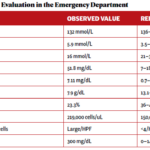As an example, Dr. Huffstutter recalls a vasculitis patient who received treatment through Project Access until he was stable enough to return to work.
“Now that he’s insured, I told him he’s officially graduated from the program and no longer needs to see me as a Project Access patient,” Dr. Huffstutter says, adding that the past four years have highlighted healthcare disparities that were less visible before the pandemic. To meet these ongoing needs, he says Project Access will be expanding to other counties within the state.
A Commitment to Leadership
Although volunteering in leadership positions requires time and commitment, Dr. Huffstutter believes giving back to his community is an essential part of his life.
“I was born and raised here in Tennessee, and this is the only life I’ve ever known,” he says. “But during my fellowship at the University of South Carolina, one of my professors, a naturalized citizen from Syria, told me, ‘You have no idea the freedoms you have in this country.’”
His professor’s words stuck with him, prompting Dr. Huffstutter to reflect on his own life and the responsibilities that come with those freedoms.
“He pointed out that if we lived in a dictatorship, we wouldn’t have these rights and responsibilities,” Dr. Huffstutter says. “I believe it’s every American’s duty to vote and be engaged in our government. If we don’t, those with selfish motivations and agendas, who don’t necessarily have the country’s best interests at heart, can undermine our freedoms.”
For Dr. Huffstutter, maintaining a leadership role within professional medical organizations allows him the opportunity to advocate for his patients and colleagues.
“As physicians, we need to testify before lawmakers to help them understand what our patients are facing, what’s really happening in healthcare, and how they can help,” he says.
Earlier this year, Dr. Huffstutter traveled to Washington, D.C., as part of the AMA delegation to advocate against cuts to Medicare payments. He stresses that rheumatologists are already stretched thin, balancing patient care and on-call duties and deserve to be fairly compensated for their dedication.
“The 4.2% reduction is a significant burden when our expenses remain unchanged,” Dr. Huffstutter explains. “For practices operating with around a 50% overhead, it’s effectively a double cut, and many practices have overheads higher than that.”
Inspiring Future Rheumatologists
Jessica Huffstutter, MD, also a rheumatologist, works alongside her father, Eugene, in the same practice. “I want my daughter to enjoy being a rheumatologist at least half as much as I have and to ensure she has every opportunity to thrive,” Dr. Huffstutter says, recalling how Jessica first started volunteering in his office as a file clerk before going on to volunteer in a triage capacity in a local hospital’s emergency department.



